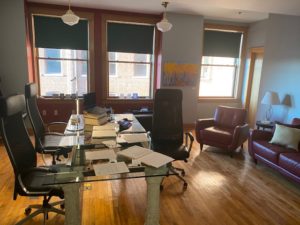Life in the Remote, and the New Social Contract
Apparently, I wasn’t paying attention and suddenly everything changed. The life of the here and now, and of being present in the moment, changed into a life of self-isolation and being remote.
I have for years enjoyed appointment as an adjunct professor of law at the University of Missouri-Kansas City School of Law, where I lecture occasionally and teach a seminar class presumptuously titled “Advising Life Sciences and Technology Entrepreneurs: The Legal Life Cycle of a High-Growth Venture: Formation to Exit.” In five days of three-hour classes for one academic credit hour, we presume to cover nearly everything an aspiring law student might possibly need to know in the subject matter, from “structuring and organizing the high-growth venture” to “financing transactions: debt, equity, strategic partnerships” and on to “realizing wealth through exit transactions: IPOs, stock & asset sales, mergers” and many salient points in-between.
In some respects this is a “vanity” class where I get to teach a captive group of very bright upper-level students about all of my views and war stories derived from a law practice now deep into its fourth decade. In order to get their grade, they must read all my assignments and feign interest and participation in class sessions.
And so, as I was on my way to teach the 2020 spring course, I got infected by the virus. Not literally infected, but professionally and technologically infected. The University cancelled all in-person classes, and in their place instituted “remote learning” classes. In my law school education, which literally started 40 years ago this year of 2020, the only “remote learning” we did was to try to understand the peculiarities and anomalies of southern girls on the campus of a mid-south private university. Truth be told, my grades in those remote studies were quite modest. And now I must teach remote.
Here I am now, 62-years-old, very comfortable running my desktop computer, several laptops and an iPad, using multiple apps on my iPhone, thinking I have technology by the tail, and suddenly I must learn entirely new technology (to me) of electronic course management and video conferencing, with only a one week’s lead time. The University provided state-of-the art technology, excellent training tools, easily accessible IT support, and personal encouragement. I have uploaded innumerable pdf documents, practiced virtual online teaching, worked on my “class environment” and jumped through mental gymnastics to convince myself that it will all work just fine. My teaching style thrives on student engagement and direct interaction. Yet now all I will see is grainy images on a computer screen, and all I will hear is distorted sounds from students located who-knows-where in self-isolation of their own safety metrics and more than likely wearing pajamas. The nearby photo shows my new classroom world, where I will sit literally alone, yet connected to students I have never met in person via the mysteries of the internet and technology. My challenge is to engage their interest by reaching through the digital images and grabbing ahold of their imaginations. A serious challenge, indeed.
Yet I’m not really that special at all. All across the United States and the world, and throughout our societies and communities, my experience is being replicated in numbers that cannot be counted and in ways that cannot be categorized. In the flash of an infected moment, everything has changed. We can listen to the news, complain about our leadership or policies, assign blame and reach out for comforting forces. But everything has changed, and we will never get it back.
Of course we will revert to some common forms. But we have seen a different world, and once seen it can never be unseen so we now know it exists, even as Adam tasted from the Tree of Life, and from here on we will live and operate on different terms. We will discover new ways of working, learning, socializing, eating our meals, watching movies, greeting our friends and turning doorknobs. Even washing our hands. We can scarcely now imagine how the life of interactivity has now migrated into the life of remoteness.
We might say it another way, that the “social contract” is being modified.
Let’s give some thought as to how the new social contract should read. Perhaps it can be a little more caring, a bit more thoughtful about how one’s youthful spring break might impact another’s old age infirmities, how leadership might place more emphasis on cooperative solutions rather than entrenched extremism, how our spoken discourse might hesitate a mere moment before inserting the verbal dagger, how a person who has two rolls might deliver one to a neighbor instead of purchasing a gross of rolls to store in the garage, and how we might speak to a friend on the elevator without mentioning the absence of six feet of safety space.
Maybe the remoteness of individuality can immigrate through heavy barriers into the connectiveness of concern.
Let’s be thoughtful as we draft the clauses of this contract amendment.
